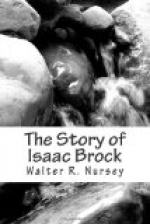Canada’s entire population was nearly 320,000—about the same as that of Toronto to-day—that of the United States was 8,000,000! To defend her broken frontier Canada had only 1,450 British soldiers and a militia—at that moment—chiefly on paper. If the Indians in the West were to be impressed with British supremacy—for they were making a stand against 2,000 American soldiers on the banks of the Wabash, in Ohio, where eighteen years before they had been beaten by General Wayne at Miami—then Amherstburg must be greatly strengthened and the Americans deterred from attack. How was Brock to obtain troops, and how were they to be equipped? The stores at Fort York were empty, provisions costly, and no specie to be had. All the frontier posts needed heavier batteries. On Lake Erie the fleet consisted of the Queen Charlotte and the small schooner Hunter. As to the militia, he had been advised that it would not be prudent to arm more than 4,000 of the 11,000 in all Canada prepared to bear arms.
To Brock’s citation of thirty pressing wants Sir George Prevost wrote him, “You must not be led into any measure bearing the character of offence, even should war be declared.” Prevost had a fluid backbone, while Brock’s was of finely tempered steel.
While affairs were in this precarious state His Excellency the Lieutenant-Governor, Major-General Brock, opened the Legislature at York. With what pride the news was received by the good people at St. Peter’s Port can be imagined. To think that this great man, gorgeous in a purple Windsor uniform and slender court sword, with gleaming silk hose and hair aglitter with silver powder, was none other than “Master Isaac,” whom the humblest Guernsey fisherman claimed as comrade, seemed past belief! To think that this important gentleman, with frilled waistcoat and cuffs of delicate lace—actually the King’s Deputy—before whom, as “Your Excellency,” Indian and paleface, gentle and simple, bowed low, was the small boy who used to play “uprooting the gorse” with the Guernsey fisher-lads—was beyond comprehension. Probably the one least affected by these honours was our hero himself. While it gratified his honest pride, it did not in the least cloud his vision. His speech from the throne proves this.
“It is a glorious contest in which the Empire is engaged,” he said, “to secure the independence of Europe, but what can we think of the American Government, which is trying to impede her effort.... The ships of England,” he continued, “had been refused shelter in United States harbours, while refuge had been extended to the ships of our inveterate enemies.” He reminded the colonists that “insulting threats had been offered to the flag and hostile preparations made.” He praised the militia, and, while wishing for peace, declared that “Canada must prepare for war, relying on England’s support in her hour of peril.” He asked the Legislature to assent to three things of vital importance—the suspension of the Habeas Corpus Act, the passage of a law to regulate the privileges of aliens, and an Act providing for rewards to be paid to the captors of deserters.




